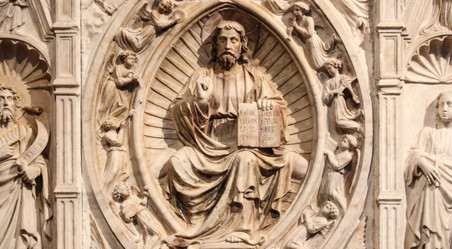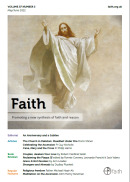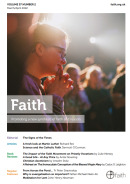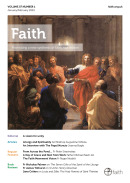Featured
Faith and Freedom
In the early days of the FAITH Movement, we published a pamphlet on religious freedom. Back then, it concentrated on the plight of Christians in Eastern Europe - behind what was called the Iron Curtain, where a Soviet-dominated system, backed by torture and imprisonment in the Gulag forced-labour camps, imposed an official atheism.
British Catholics and the Great War
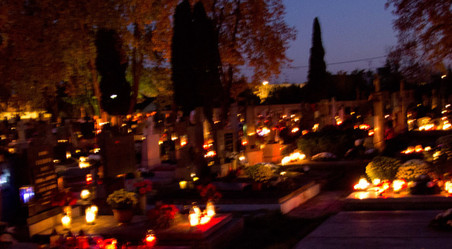
The First World War is one of the most iconic parts of our recent history: trenches and zeppelins, gasmasks and dug outs, It’s a Long Way to Tipperary and Blackadder Goes Forth. Although none of us were alive during this ‘war to end all wars’, most people over the age` of 40 will have met at least one veteran, and many of our families still pass on stories of their own ‘war heroes’ and, in some cases, bear the scars of that conflict.
Original Sin

In the Prologue to St. John's Gospel concerning the Logos, the Word; we read:
“In him was life, and the life was the light of men. ...He was in the world, and the world was made through him, yet the world knew him not. He came to his own home, and his own people received him not.” [Jn 1: 4, 10-11].
In the perspective of the FAITH Movement, the Son of God incarnate comes as Son of Man, as God’s self-revelation to us by taking on flesh, our flesh, as a communication of His love. Yet there is another aspect: “his own people received him not”. Now, God's love for us will have to take on a new meaning because of the impact of human sin.
Interview - Joanna Bogle talks to Katherine Daniels
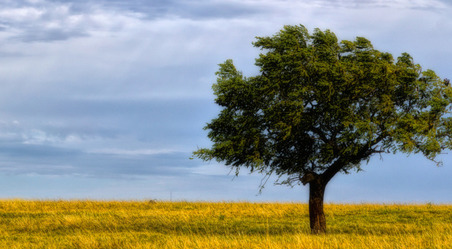
It’s quite a story: romantic, tragic, poignant and yet somehow with a happy ending. Last year, Katherine Daniels quit her job to edit and publish her late husband’s book – and it has become something of a best-seller among Catholics.
We are having sandwiches and coffee in a London cafe after a weekday Mass at a church near London Bridge. The story of the book and its message is deeply bound up with a journey in faith.
Holloway on - The Lord of History
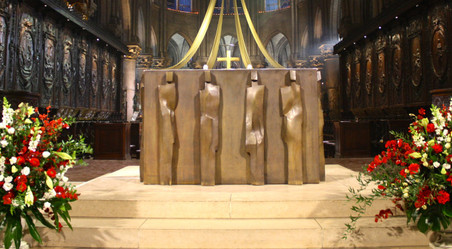
The affirmation of Jesus Christ as The Lord of History appears in the Fourth Eucharistic Prayer: it is the canon of the History of Salvation and significantly recapitulates the very essentials of the greatest thinking of the Greek Fathers of the Church upon the meaning of Christ in the history of Man and in the work of Creation. This vision of God’s work within human society and history means that the Church and her institution is natural to Man and to the human order. It must also mean that the Eternal Sacrifice of her Cross and Eucharist, and the Episcope, the ‘pastoral care’ of her divine magisterium, dominates all human history in vocation if not in actual fact.
Book Reviews - Did the Saviour See the Father?
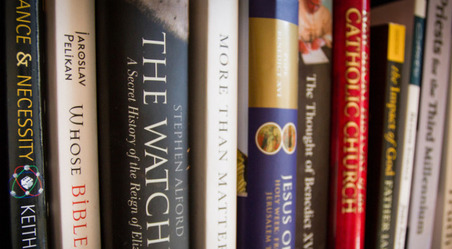
Medieval depictions of the infant Christ are firmly fixed in the Western imagination. Although such depictions are obviously of Jesus as a very small toddler or baby, he tends to sit upright and poised on the Blessed Virgin’s lap, like an adult, with a strikingly all-knowing gaze radiating through his babyish features, centred on a pair of piercingly prescient eyes.
Book Reviews - God and Cosmos: Moral Truth and Human Meaning
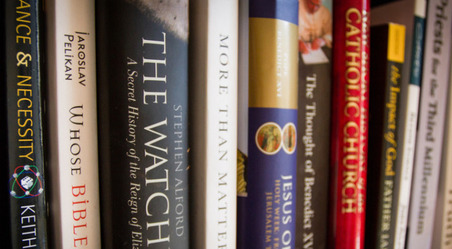
This book is a sequel (of sorts) to Good God which looked at moral apologetics and a theistic ethic. One is given the impression that the first book was well received. This second book’s intention is to show the weakness of the alternatives to such an ethic and the strength of theistic ethics in explaining moral truth.
Book Reviews - Flourishing - Why We Need Religion In A Globalised World
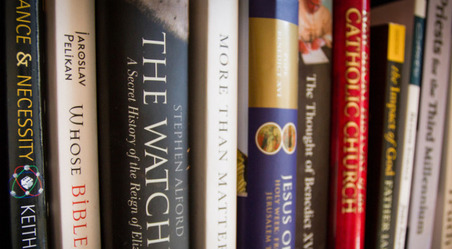
In this interesting and wide-ranging book Miroslav Volf examines the relationship between globalisation and the world religions as a means of achieving human flourishing. The roots of the book lie in the Faith and Globalisation Seminar that took place at Yale University in the fall semesters 2008-11. By ‘flourishing’ Volf means a life that is lived well, goes well and feels good. He expresses it as ‘the good life’, ‘the life worth living’, evoking the biblical images of a tree by streams of water
Book Reviews - Making Gay Okay: How Rationalizing Homosexual Behavior is Changing Everything
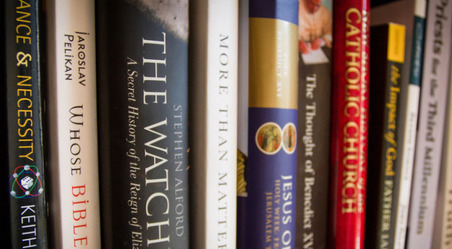
In this deeply researched and adroitly argued book, Robert Reilly shows the extent to which the normalization of homosexuality has deep roots in philosophical debates that go back centuries. If Aristotle insisted not only on the objectivity of truth but on the ability of the intellect of man to apprehend it, the French philosophe Jacques Rousseau denied this objectivity by ushering in what Cardinal Ratzinger called the ‘tyranny of relativism,’ which gives the rationalization of homosexuality so much of its philosophical underpinning by arguing that natural law is merely a human construct and, as such, susceptible of subjective definition.
-
Faith and Freedom
In the early days of the FAITH Movement, we published a pamphlet on religious freedom. Back then, it concentrated on the plight of Christians in Eastern Europe - behind what was called the Iron Curtain, where a Soviet-dominated system, backed by torture and imprisonment in the Gulag forced-labour camps, imposed an official atheism.
The collapse of the Communist system brought freedom to Eastern Europe. The central figure in achieving that, Pope St John Paul, who 1979 pilgrimage to his native Poland gave voice to the authentic Christian heritage of that country, and opened up a new chapter in history that unfolded over the next decade.
Today – and St John Paul in fact prophetically warned of this – we face new threats to freedom. For there can be no true freedom that is not connected to truth: the truth about the human person, speaking to men and women to men about their own dignity and value.
St John Paul’s successor Benedict XVI, in a notable sermon shortly before his own election to the papacy, spoke of a “dictatorship of relativism”.
Realistic
A realistic look at today’s Britain confirms that the presence of this. A Member of Parliament – or a magistrate, or the Head Teacher of a school, or a borough councillor - who dared to say “Children should be taught that marriage is the lifelong union of a man and a woman, bringing new children into the world” would in all probability be denounced with vigour and forced to resign. Such denunciations would very likely be done in the name of justice and humanity – because, in the weird confusion that is modern Britain, there has to be a pretence that it is inhumane to suggest that marriage can only between a man and a woman. There is a sort of weird absurdity which dictates that the realities of human sexuality, and the transmission of life itself, must be subjected to a current ideology. Discussion of the subject must not concentrate on truth as such, but on what is deemed to be politically correct. And in this there is a ghastly mimicry of the language of Marxist-dominated regimes with a political ideology which similarly allowed of no public dissent.
St John Paul analysed the problem in his great encyclical letter Veritatis Splendor, honouring the splendour of truth. And in exploring the wide implications of it all, he noted “the risk of an alliance between democracy and ethical relativism, which would remove any sure moral reference point from political and social life, and on a deeper level make the acknowledgement of truth impossible” (VS 101) and warned us, as he had done in an earlier encyclical, that “As history demonstrates, a democracy without values easily turns into open or thinly disguised totalitarianism". (Centesimus Annus, 1991; 46).
What is to be done?
The Church is custodian of truth. She must and will continue to affirm truth. She cannot impose it: it imposes itself in people’s hearts and minds. She must affirm her right to speak the truth. Her pastors must affirm it. The faithful must affirm it.
As Catholics, we are not seeking any special privileges. Pope Benedict XVI expressed the position of the Church luminously and with characteristic clarity: “the Church does not impose but rather freely proposes the Catholic faith” (Oct 2, 2008) The Church does not legislate anything in society. There are those who have that responsibility. What she offers is a message that is a guarantee of community solidarity, human dignity and authentic freedom.
Speaking in Westminster Hall, at the heart of the most famous Parliament in the world, Pope Benedict emphasised this necessary independence of the Church and its place in society for the common good. He highlighted Britain’s achievements as a “pluralist democracy which places great value on freedom of speech, freedom of political affiliation and respect for the rule of law, with a strong sense of the individual’s rights and duties, and of the equality of all citizens before the law and noted that there was much in common here with Catholic social teaching.
He went on to explore the relationship between faith and reason, and to emphasise how they must and should work together, urging that “ the world of reason and the world of faith – the world of secular rationality and the world of religious belief – need one another and should not be afraid to enter into a profound and ongoing dialogue, for the good of our civilization”.
He gave the example of William Wilberforce – the politician, inspired by Christian principles, who devoted his life to the abolition of the slave trade – as an example of how such dialogue can and should work.
“Religion, in other words, is not a problem for legislators to solve, but a vital contributor to the national conversation. In this light, I cannot but voice my concern at the increasing marginalization of religion, particularly of Christianity, that is taking place in some quarters, even in nations which place a great emphasis on tolerance. There are those who would advocate that the voice of religion be silenced, or at least relegated to the purely private sphere. There are those who argue that the public celebration of festivals such as Christmas should be discouraged, in the questionable belief that it might somehow offend those of other religions or none. And there are those who argue – paradoxically with the intention of eliminating discrimination – that Christians in public roles should be required at times to act against their conscience. These are worrying signs of a failure to appreciate not only the rights of believers to freedom of conscience and freedom of religion, but also the legitimate role of religion in the public square. I would invite all of you, therefore, within your respective spheres of influence, to seek ways of promoting and encouraging dialogue between faith and reason at every level of national life.” (Sept 20th 2010)
Taking up the challenge
Benedict XVI’s visit revealed a a vast reservoir of goodwill towards the Church. In thanksgiving for the success of the visit, a Procession of the Blessed Sacrament now makes its way annually across the Thames from Westminster Cathedral to St George’s Cathedral, Southwark. The Houses of Parliament make a dramatic backdrop as it crosses Lambeth Bridge. Here is a statement about religious freedom, and a joyous one.
But to ensure that this freedom is truly guaranteed, we must make real use of it for the common good. The Church’s public presence lifts people’s hearts, and the service she gives – in Catholic schools, homes for the elderly, chaplaincies in prisons and hospitals, and the vast range of projects for the poor and disabled and so on – is generally appreciated. We do not need to beg for our right to be heard. But we do need courage, clarity and wisdom in speaking out.
A Catholic school must teach the Catholic faith – including the Church’s teachings on marriage and family life, in ways that are appropriate for the children’s ages and needs. Catholics must make use of their freedom to give public witness to their faith: suggestions that there should not be Christmas carols sung in public or Christian symbols displayed in public places are absurd and in no way reflected in our country’s laws or traditions. Catholic parishes are free to hold processions (making common-sense arrangements about traffic and so on as required), open-air events, fund-raising projects, and more. And we can and must teach the fullness of the Church’s message in our events and conferences.
Opposing the current gender ideology
Pope Francis speaks without bothering about political correctness. Highlighting the new attempts to impose a gender ideology he has been blunt “Today, children are taught this at school: that everyone can choose their own sex. And why do they teach this? Because the books come from those people and institutions who give money...God created man and woman; God created the world like this and we are doing the exact opposite.” (2016)
And he has noted what any person of common sense has also noted: "The family is threatened by growing efforts on the part of some to redefine the very institution of marriage, by relativism, by the culture of the ephemeral, by a lack of openness to life." (2015)
Every Catholic family, parish, school and institution in Britain should have at least one copy of the Catechism of the Catholic Church and should use it frequently. Here is a quote from it on the topic discussed by Pope Francis. We quote it here in solidarity with the Pope and to emphasise that we have a full right to do so:
"God created man in his own image ... male and female he created them"; He blessed them and said, "Be fruitful and multiply";"When God created man, he made him in the likeness of God. Male and female he created them, and he blessed them and named them Man when they were created."
Sexuality affects all aspects of the human person in the unity of his body and soul. It especially concerns affectivity, the capacity to love and to procreate, and in a more general way the aptitude for forming bonds of communion with others.
Everyone, man and woman, should acknowledge and accept his sexual identity. Physical, moral, and spiritual difference and complementarity are oriented toward the goods of marriage and the flourishing of family life. The harmony of the couple and of society depends in part on the way in which the complementarity, needs, and mutual support between the sexes are lived out.
"In creating men 'male and female,' God gives man and woman an equal personal dignity."Man is a person, man and woman equally so, since both were created in the image and likeness of the personal God."
Each of the two sexes is an image of the power and tenderness of God, with equal dignity though in a different way. The union of man and woman in marriage is a way of imitating in the flesh the Creator's generosity and fecundity: "Therefore a man leaves his father and his mother and cleaves to his wife, and they become one flesh."All human generations proceed from this union.
(CCC, emphasis original).
Practicalities
As a small project, why not photocopy those words from the Catechism, and send the copy to your Member of Parliament with a brief note, saying that this is the message that you will be teaching the children in your Confirmation group/parish youth group/RE class and you would like an assurance that it is not against the law to do so?
Next: a bigger project – more public witness of the Faith.
Back in the 1970s, it was the courage of Polish Catholics in gathering for Mass in the open-air at Nowa Huta that finally made the Communist authorities allow the building of a church. The courageous Archbishop who celebrated Mass in the open air was the one who finally blessed the great new church – on a day of great joy and pouring rain with vast crowds attending – and who would later give that courage to the wider Church on his election to the Papacy as John Paul II.
His approach, in dealing with a difficult situation, was one of prudence and tenacity. He did not rouse people to anger but worked steadily towards the goal, achieving a measure of freedom that at one times seemed impossible...and then, under God’s providence, achieving a great deal more.
“Do not be afraid!” We have a right to proclaim our Faith, to teach it, the pass it to the next generation. We have a specific heritage here in Britain bequeathed to us by those who forged a Parliamentary democracy over the centuries. And we have something else that John Paul did not have: we have his example. He showed us how to work for freedom in circumstances rather tougher than we are currently experiencing in Britain, and he showed us that the public celebration of the Faith - processions, open-air Masses, youth events - plays a central role in achieving or affirming the rights of Christians.
Real needs
There can be a certain sort of glee displayed by some Catholics who seem positively to gloat over things appearing difficult in modern society: “You mark my words – they’ll soon be banning the word Christmas”. “You aren’t allowed to mention the word Easter – it’s called a hate crime”. And so on. This sort of talk may be fun but is unrelated to the real needs of Christians in Britain today: celebrating Easter isn’t a hate-crime and there are no plans to make it so. And no one is banning the use of the word Christmas. But what is certainly happening is that Christians are allowing their faith to be marginalised and somehow relishing it. Let’s stop doing that. Come and join us walking through London in procession this September. And if your parish/deanery hasn’t had a procession or open-air Catholic event recently, why not start a discussion about getting something organised? And don’t start with a complaint or a demand, but with a joyful suggestion for a celebration of a Faith that is centred on glorious truths and has a message that our country badly needs.

